If there is one constant in the history of seafaring, it is that from time to time ships misplace their entire complement of crew and passengers, which leaves the empty vessel to drift unattended. This is a perfectly natural process. One should never hesitate to board and salvage one of these mysteriously empty craft. After all, it’s not as if whatever happened to the previous occupants will affect you!
This is as true for starships as it is for sea vessels, as these five works will show.
The Cosmic Computer by H. Beam Piper (1963)
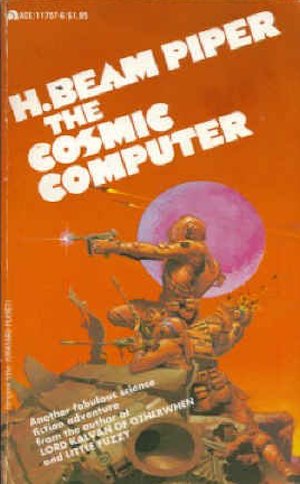
Whereas the origin of many derelicts is a matter of conjecture, the many such drifters in the Trisystem are easily explained. Their history is well documented.
The Federation established forward supply bases in the system during its war with the secessionist System States Alliance. Having crushed the upstarts, the Federation deemed the war material in the Trisystem not worth transporting. The facilities were simply mothballed and abandoned in place.
The Trisystem’s one habitable world, Poictesme, has until now been eking out a meagre living salvaging the Federation’s trash. Conn Maxwell believes the Trisystem has all it needs for prosperity…if only Conn can somehow convince Poictesme to embrace more productive uses of Federation relics. What better way to persuade the gullible rubes of Poictesme than to tell them a lie they desperately want to be believe? Surely the Merlin supercomputer will have all the answers they need. Conn believes Merlin is only a myth…but a useful myth. Why ruin a beautiful dream with the truth?
Points to the Federation for the depraved indifference demonstrated by leaving so much war material behind in the Trisystem. This war material isn’t limited to firearms and shipyards filled with half-constructed vessels; it included such delights as hellburners and planetbusters. I am as astonished as you are that the Federation collapsed soon after the end of this novel; see Piper’s Space Viking for more details.
I am somewhat embarrassed to admit it took me decades to notice the significance of the duplicitous protagonist’s given name.
Gateway by Frederik Pohl (1977)
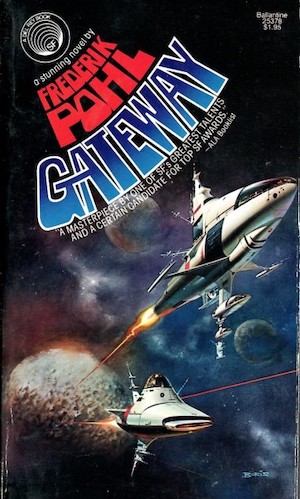
Half a million years before humans ventured into space, the Heechee briefly occupied the Solar System. The aliens are long gone but they left a wealth of relics, not least of which is an asteroid base, Gateway. Within the asteroid, a fleet of starships. The Heechee built well. Many of the craft are still fully functional.
Unable to recognize or read Heechee user manuals, humanity has fallen back on the tried and true method of simply poking starship controls to see what happens. Many human pilots have ventured to the stars. A much smaller number returned alive and well. Luckily for Earth’s interstellar prospects, there is no shortage of people like Robinette Broadhead, whose desperation far outweighs caution.
Gateway serves as an example of another sort of book, the kind that raises questions to which the reader is better off not expecting an answer. The first novel sold well and was followed by a number of sequels, each expanding the setting in increasingly disappointing ways. The original, however, is still a classic.
Sarcophagus (Blake’s 7, Season 3, Episode 9), written by Tanith Lee (1980)
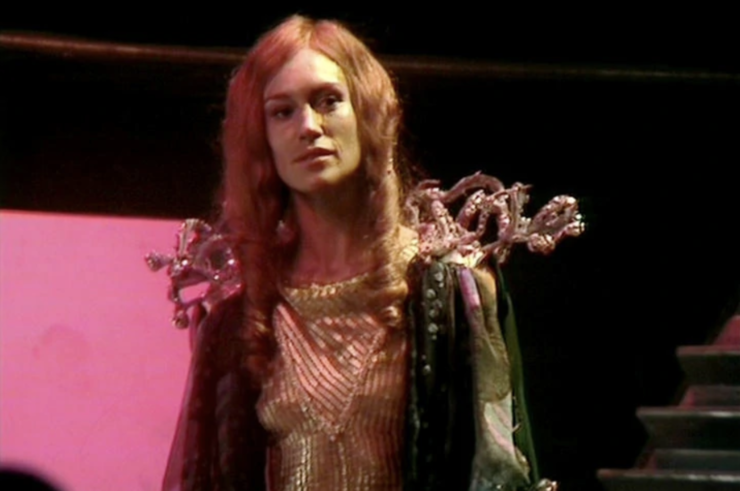
The crew of the Liberator are no strangers to mysteriously derelict alien starships, having commandeered the abandoned alien starship Liberator very early in Blake’s 7’s run. Current commander Avon prudently regards the latest derelict as inherently suspicious. Why would a powerless hulk be adrift in deep space? How is it that Liberator just so happened across it? Is it a trap? Avon doesn’t want to board the hulk but is outvoted by his crewmates.
Avon and the two crewmembers he distrusts least venture into the derelict. Among the curious instruments still functioning on the craft is a timer counting down to some no doubt unpleasant event. The explorers manage to escape with their lives. The catch? Three people set out for the derelict but four returned.
Much like Alice’s Restaurant, Blake’s 7 is the name of the show but not the name of the ship or the collection of morally flexible people inside. In fact, at this point in the long-running television program’s run, Blake isn’t even the name of any of the characters on board the Liberator, Blake having been lost to the Liberator in the final episode of Season Two.
Pushing Ice by Alastair Reynolds (2005)
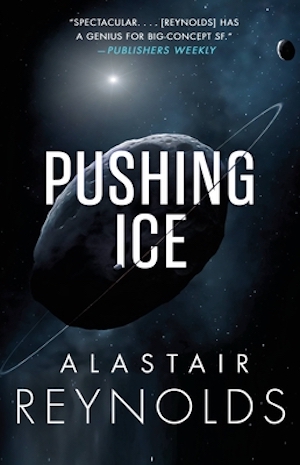
Saturn’s moon Janus is ostensibly a natural moon. Its sudden acceleration out of orbit towards deep space is unexpected, inexplicable, and demands investigation. The ice miner Rockhopper is the only human spacecraft in a position to investigate. Nobody in the Solar System will ever see the Rockhopper or its crew again.
Among the unforeseen alien mechanisms hidden within Janus is a space drive fully capable of sweeping up unfortunate visitors like the Rockhopper. When Janus exits the Solar System en route to Spica, Rockhopper and its crew are carried along. Relativistic travel to a star 250 light years away dooms the crew to temporal exile. That is only the first step of the journey that awaits.
Among the challenges facing the crew is the fact that their story has been written by Alastair Reynolds. Reynolds generally hews to science as we know it. Ergo, to cross interstellar gulfs is to cross expanses of time as well. Rockhopper’s crew isn’t as unfortunate as the characters in Poul Anderson’s Tau Zero, but they won’t be seeing home again.
Ancestral Night by Elizabeth Bear (2019)
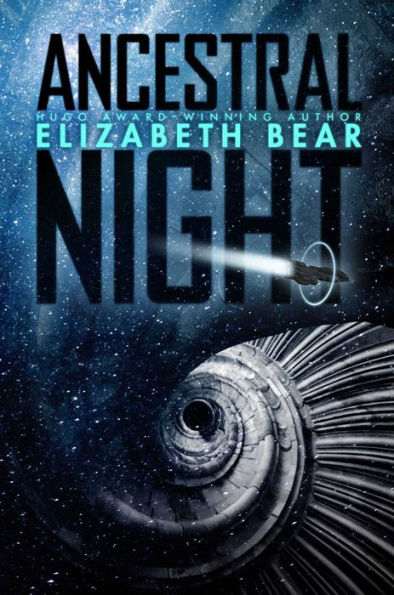
The Synarche provides its citizens with a guarantee of life’s basics, in return for which citizens are expected to be productive members of society. Through no fault of their own, Haimey Dz and her partners have been coming up short in their chosen occupation, salvaging derelict starships. Unless Dz and company can turn their luck around, they may lose their government subsidy.
A seemingly abandoned starship appears to offer hope. Close examination reveals that the ship is the scene of a brutal war crime. Nevertheless, Dz returns to her ship in possession of a valuable treasure, one she didn’t ask to upload directly into her head. It’s a treasure that the Autonomous Collective Republic of Freeports, AKA the Republic of Pirates, will cheerfully murder to possess.
The Synarche may appear to be something of a nanny state, what with its regard for citizens’ individual and collective wellbeing, while the libertarian Republic, where freedom of choice is limited only by the defensive abilities of one’s chosen victims, is portrayed rather negatively. I’ve been thinking quite a bit about the various types of government depicted in SFF lately (so, of course, watch this space for the upcoming essay).
***
Derelict spacecraft are popular plot facilitators. These five only scratch the surface. No doubt you may have favourites not mentioned above. I have favourites not mentioned above because I wanted to include no more than one book per decade. Feel free to mention the heretofore unmentioned works in the comments, which are, as ever, below.
In the words of fanfiction author Musty181, four-time Hugo finalist, prolific book reviewer, and perennial Darwin Award nominee James Davis Nicoll “looks like a default mii with glasses.” His work has appeared in Interzone, Publishers Weekly and Romantic Times as well as on his own websites, James Nicoll Reviews (where he is assisted by editor Karen Lofstrom and web person Adrienne L. Travis) and the 2021 and 2022 Aurora Award finalist Young People Read Old SFF (where he is assisted by web person Adrienne L. Travis). His Patreon can be found here.










